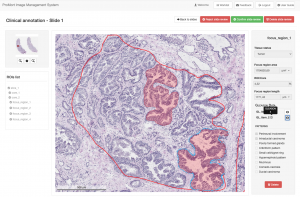CRS4 addresses the challenge of managing large and complex biomedical data by creating and integrating open source tools to build research platforms for supporting the entire data transformation process - from raw data to primary analysis results. A significant example of this is the evolution of the CRS4 digital pathology platform, which supports the visualization and analysis of Whole Slide Images (WSI), obtained through high-resolution scanning of slides in anatomic pathology. The platform, introduced for the first time in 2015, supports clinical research activities that require the examination and annotation of a large number of digital images. The platform has been successfully tested in several use cases, including: distance learning in the 2016 European Cy-Test Project; manual annotation of slides in the ProMort study of the Karolinska Institutet (published in 2019); automatic identification of tumor tissues through deep learning systems in the ongoing European project DeepHealth.
- Zelic R, Zugna D, Bottai M, Andrén O, Fridfeldt J, Carlsson J, Davidsson S, Fiano V, Fiorentino M, Giunchi F, Grasso C, Lianas L, Mascia C, Molinaro L, Zanetti G, Richiardi L, Pettersson A, Akre O. Estimation of Relative and Absolute Risks in a Competing-Risks Setting Using a Nested Case-Control Study Design: Example From the ProMort Study. Am J Epidemiol. 2019 Jun 1;188(6):1165-1173. doi: 10.1093/aje/kwz026.
- Lianas, L., Piras, M., Musu, E., Podda, S., Frexia, F., Ovcin, E., Bussolati, G., & Zanetti, G. (2016). Cytest - A New Platform For Training And Testing In Cytopathology. Diagnostic Pathology, 1(8). doi:10.17629/www.diagnosticpathology.eu-2016-8:185




